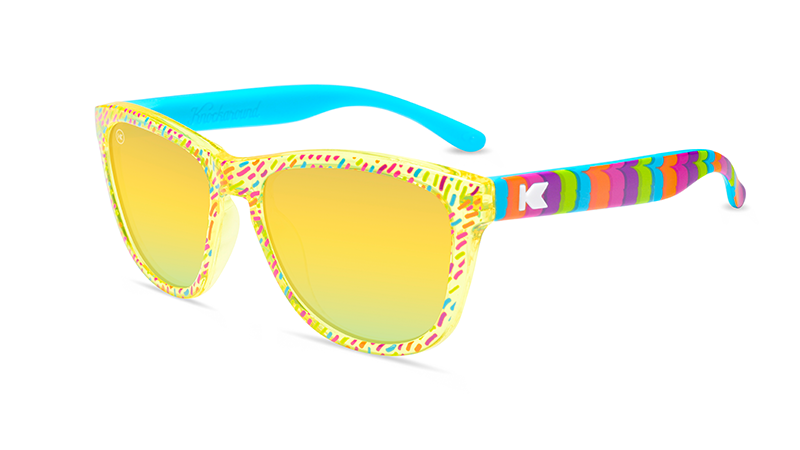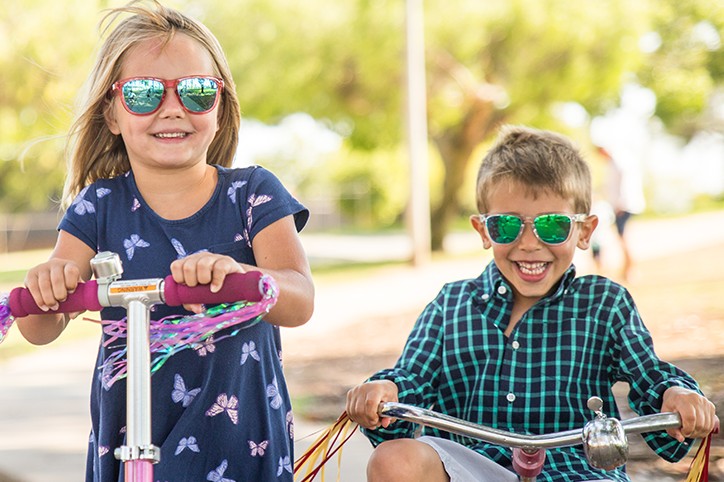I couldn’t wait for a lot of things when I had my son – including when I could put him in cute little kiddie sunglasses. Like most parents, I found I liked them more than he did at first, but stick with it because it’s so important to protect their sensitive little eyes! I found that modeling sunglasses myself and being excited about them helped get him excited too.
Knockaround specifically I think has the most adorable options and, for better or worse, you’ll probably find that you need to buy a few pairs because most toddlers love throwing these around when you’re not looking just as much as they did their pacifiers. These Knockaround shades are my personal favorites (so much so that my son wearing these is the wallpaper on my phone).

As fun and important as shopping for sunglasses is, shopping for glasses can be stressful, even both types of glasses are important, which is why I brought in an expert from My Eyelab to share insight on how to shop for glasses and sunglasses, when to get eyes checked, and warning signs to look out for.
At what age should children have their eyes checked for the first time?
“Children should first have their eyes checked at 6 months old,” says Monica Hazien, O.D. for My Eyelab. “After 6 months, it is recommended to bring them back in to get checked at 3 years old, before starting kindergarten or first grade, and then every 1-2 years after that (unless their doctor indicates an exam is needed sooner).”
It is important for everyone to have an eye exam, including children, regardless of how well they are seeing. According to Hazien, a child can have 20/20 vision, but they may have a freckle on their retina that needs to be evaluated, similar to how a freckle on their skin would need to be. It is very important for children to have the health of their eyes evaluated, in addition to being checked for glasses at regular intervals.
If a young child needs glasses, how do we choose the best ones?
Try to be enthusiastic and excited about your child getting glasses. “Your enthusiasm is contagious, and if your child was upset about needing glasses, they may feel more excited because of your enthusiasm,” says Hazien. “A child will likely need a smaller frame that will fit the bridge of their nose and ears better than an adult frame. Speak to the optical staff to ensure that the frames chosen are a good fit for the child. For very young children, some manufacturers make frames that come with a head strap to help keep the glasses on children’s heads and to prevent them from falling or being pulled off. Children should get polycarbonate lenses which are more shatter-resistant than regular plastic lenses to protect their eyes in case of breakage. Anti-reflective coatings and blue light blocking lens coatings are recommended for kids that spend a significant amount of time studying and playing on electronic devices.”
What about sunglasses?
“It is never too early for children to start wearing sunglasses,” says Hazien. “Children learn by watching and observing; parents wearing sunglasses when outdoors will set a good example for their kids. My 9 month old daughter has been wearing sunglasses during outdoor walks since she was 2 months old. Similar to choosing eyeglasses, showing enthusiasm about sunglasses can make kids more excited and willing to wear them. Letting them have input on which frames they like can also be helpful. The frame should be a good size for the child’s head. The optical staff can help determine if the sunglasses picked out are a good fit.”
What are some things to watch out for?
“Kids can experience blurry vision and/or eyestrain and not be able to explain these symptoms to their parents,” says Hazien. “It is important for parents to bring their kids in for eye exams and baseline testing from a young age. Blurry vision and eyestrain caused by not wearing glasses can effect a child’s ability to focus and function in school, which can have a negative impact on school grades. Sometimes, kids can even strain their eyes and force themselves to read small print, but this does not mean that they do not need prescription glasses.”
As a parent, Hazien highlight the following signs as being important warnings to bring your child to their eye doctor for an examination:
Squinting, rubbing their eyes frequently, blinking excessively, not maintaining eye contact, not tracking an exciting moving object or person, one eye turning in or turning out, or a white reflection of their pupil (instead of the normal red reflex).
Do your kids wear glasses or sunglasses?




